Full-time lines funded, tuition frozen
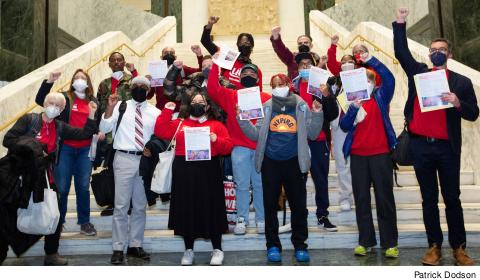 |
Governor Kathy Hochul’s budget announcement this April, her first since becoming governor last year, trumpeted increases to CUNY that will benefit the university in the short-term. It is the first time in decades that the PSC and others have not had to fight proposed budget cuts and the first time since the Cuomo era that CUNY has seen a non-austerity budget.
PSC President James Davis said the budget was the result of work by the union and its allies. “The tenacious advocacy of PSC members, CUNY Rising Alliance groups and the 76 New Deal for CUNY legislative cosponsors made possible the increased funding for full-time faculty lines, fringe benefits, critical infrastructure, part-time TAP, closure of the TAP gap, TAP for incarcerated individuals, childcare centers and other investments,” Davis said.
TOWARD MORE FUNDING
Davis added, “It’s clear this budget demonstrates a renewed understanding and appreciation of CUNY’s ability to uplift our communities, build futures and power New York State’s economy.
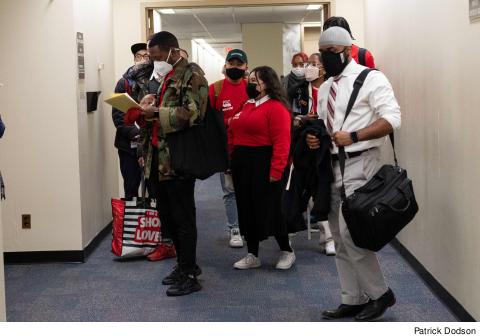 |
It sets us on a course to a New Deal for CUNY, which we must follow for the sake of future generations of CUNY students. Public institutions such as CUNY that support working people and communities of color have been chronically underfunded for too long; undoing that damage will require more transformative investment. CUNY will receive the largest year-over-year increase in decades, but the senior colleges will still be left next year with per-student funding below 2009 levels.”
POSITIVE GAINS
The budget allocation freezes CUNY tuition, a positive step. The budget sets aside $53 million to fund 500 new full-time faculty lines. The budget includes a one-time $60 million investment in operational support for CUNY. CUNY’s School of Labor and Urban Studies will see a $1.2 million investment. Mental health services will see a $2 million boost, which is an improvement on the status quo, but PSC sources believe more is needed to meet the needs of CUNY students.
Gotham Gazette noted that the budget includes “about $69 million to expand the Tuition Assistance Program for part-time students” and “includes $965.8 million in capital funds for CUNY facilities, many of which are in disrepair.” It said that “$15.6 million was allocated to help CUNY and SUNY campuses create childcare centers.”
PAST BUDGETS
PSC Legislative Representative Luke Elliott-Negri put it this way: “CUNY will take in about $220 million in new operating dollars this year. This is the largest year-over-year state increase to the operating budget since the PSC has been keeping data on such things. The last time we got a big bump was from 2008 to 2009. That budget was drafted under a new Democratic majority in the Senate, before [then-Governor Eliot] Spitzer went down and before the Great Recession kicked off. This year’s increase is two to three times larger than that one. Before that we had George Pataki and Mario Cuomo, so I honestly don’t know how far back you’d have to go to find an increase of this size. But it’s far.”
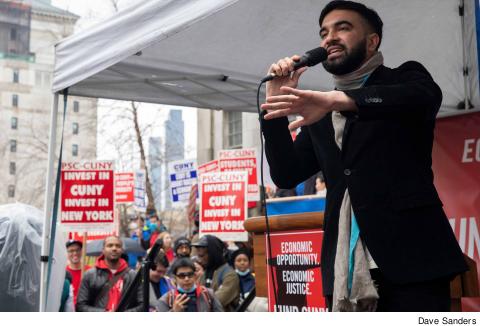 |
PSC and many of our advocates, understand that this is a partial victory. The union and its allies hope to push the governor’s initial proposed budget allocation for higher education even further. The union also seeks a budget that would include funding for additional parts of the New Deal for CUNY, landmark legislation that would increase the number of full-time faculty and staff and make CUNY tuition-free. Queens State Assembly Member Zohran Mamdani was one of the lawmakers backed by the Democratic Socialists of America (DSA). He voted “no” on the budget, he said, because the allocation for CUNY didn’t go far enough.
NEED INVESTMENT
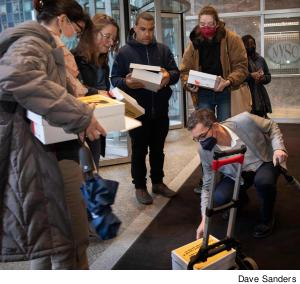 |
“While this budget is an improvement for CUNY, this still leaves the 16,000-plus students, faculty, staff and recent alumni that call my district home without the investments that they deserve,” Mamdani said on the assembly floor before the vote. “[These needed] investments would fund academic advisors, create adjunct pay parity, adequately fund mental health services and would decrease and ultimately eliminate tuition.
As we fall short, I think of the stories of those I’ve connected with as I’ve fought for the New Deal for CUNY. I think of Rebecca, an adjunct professor driven into homelessness, by lack of adjunct pay parity. I think of Stephanie, who is forced to work multiple jobs, sleeping only two to three hours each night, just so that she could keep [up] with the cost of tuition. I think of Devon, a chronically homeless student, who is never able to get mental health care due to the lack of such services on his campus.” Mamdani added, “It is for all of them that I must vote ‘no,’ and it is for all of them that I will continue to fight to pass the New Deal for CUNY.”
Spectrum News reported that higher education “advocates are also concerned the budget did not do enough to address affordability issues,” noting that the New York Public Interest Research Group “pointed to the lack of deals to increase the maximum Tuition Assistance Program Award or finding ways of reducing the cost of tuition.”
UPSET LAWMAKERS
Other lawmakers were upset that Governor Hochul buckled to right-wing pressure during negotiations to roll back hard-fought bail reforms and to shift public money to a new stadium for the Buffalo Bills.
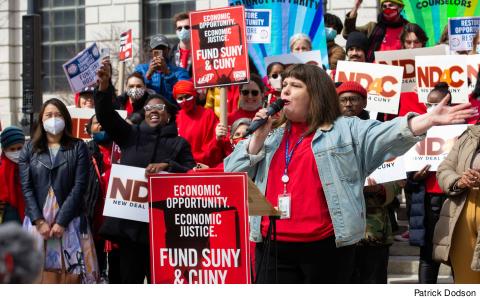 |
“This budget fails to meet the moment and even reverses hard-won advances for basic justice,” said a statement from Emily Gallagher, a DSA-backed state assembly member from Brooklyn.
Assembly Member Ron Kim of Queens referred to the budget in a tweet about Buffalo Bills owner Terry Pegula saying, “A billionaire got 100% of what they wanted while CUNY/SUNY got 25%.”
The PSC chapter at Brooklyn College released a sobering statement about the budget, saying, “We need to be clear that Governor Hochul betrayed our students, our members, our coalition and our values.” The PSC BC chapter added, “$240 million is less than half of what we need to make CUNY the transformative institution it should be.”
SOME GAINS
The statement continued, “We can be relieved that TAP now covers part-time students while also being furious that the chronic and racist underfunding of CUNY continues.”
Increased state funding to CUNY is the result of years of union action, which included successfully pressuring the CUNY administration at the beginning of the academic year to increase its budget request from previous years, several mass demonstrations demanding funding increases and a New Deal for CUNY, many lobbying trips to Albany and constant communication with coalition allies, including the University Student Senate and the CUNY Rising Alliance.
Looking ahead, the state budget funding increase is but one step forward in a protracted fight. The union demands more increases for more full-time faculty positions, as well as direly needed full-time mental health counselors and academic advisors. More funding is also necessary to make CUNY tuition-free, the union said. The PSC is now focusing on winning more funding in the city budget (see page 2), and it will continue to move forward and advocate for the passage of the New Deal for CUNY.

